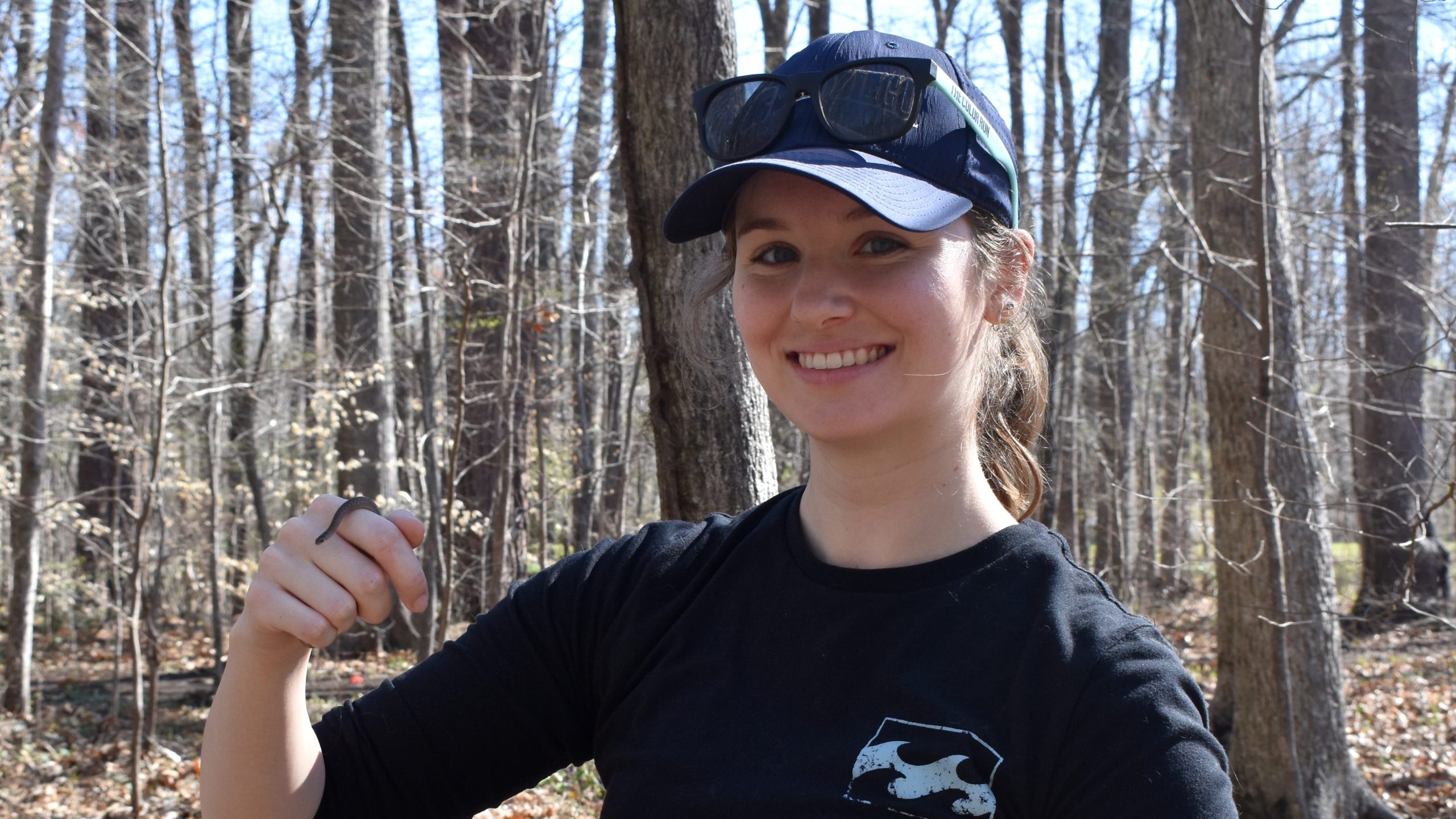Researcher Spotlight – Alexandria Nelson

2021-22 Global Change Fellow
PhD student, Applied Ecology
Advisor: Dr. Skylar Hopkins
Every year the Southeast Climate Adaptation Science Center funds a multi-disciplinary cohort of Global Change Fellows representing colleges across NC State University. The current cohort of students represents the decadal anniversary of this program! Here are some highlights about 2021-22 Fellow, Alexandria Nelson and the applied research she’s conducting.
About You
What do you study?
I study parasite ecology. I am broadly interested in understanding host-parasite interactions, parasite-parasite interactions, and mapping of parasite life cycles. For my dissertation I am exploring how parasite communities in amphibians and reptiles are shifting due to global change. I am also developing techniques to facilitate the use of parasites as bioindicators of overall ecosystem health. My work includes identifying parasite species through DNA sequencing and eDNA.
What (or who) influenced you to go into this field of study?
I never expected to become a parasitologist, but I’ve always had a passion for marine biology. As an undergraduate student I answered an ad posting to take care of live fish, which happened to be for a parasitology laboratory. As I began taking on additional responsibilities in the lab I learned more about parasite life histories, and I came to the realization that parasitology has almost endless opportunities and applications in ecology. Through my understanding of parasite ecology, I have the freedom to study almost any organism, which is ultimately what inspired me to pursue parasitology as a career.
What do you think is the most pressing issue related to global change?
Parasites are often ignored in ecology, which is a problem because they are incredibly useful for understanding global change. Parasites can tell us about host migrations, host biodiversity, presence of invasive species, food web degradation, and overall ecosystem health. If more climate biologists incorporated parasites into their work, we’d have a more complete picture of what’s happening around the world with climate change.
About Your Research

Who will benefit from your research?
I hope that my dissertation will be useful to ecologists and conservationists that are interested in understanding impacts on ecosystems due to global change. I think land managers and policymakers that are invested in monitoring endangered or difficult-to-find species may also benefit from my research. I’m working with charismatic snake and turtle species, so I hope to produce science communication projects that engage the public and young aspiring biologists.
How would you describe your research to a 10th grader?
I work with parasites as tools to monitor difficult-to-find animals. For example, trematodes are parasites that usually infect three host species throughout their life cycle. Here in North Carolina, there are trematodes that infect snails as a first intermediate host, frogs as a second intermediate host, and snakes as a final host. These trematodes cannot survive in the environment unless all three types of hosts are present. Therefore, if we find those trematodes infecting snails in a certain lake, we know that frogs and snakes must live around that lake too.
How would you describe your research to an expert in another scientific field?
I study the use of complex life cycle parasites as bioindicators of cryptic host species diversity and overall ecosystem health. By sampling larval trematode parasites in common freshwater and coastal first intermediate host snail species, I can make inferences about the presence of second intermediate and final host reptiles and amphibians without needing to destructively sample them. This is useful for endangered host species, like diamondback terrapins, or host species that are difficult to monitor due to their cryptic nature, like rainbow snakes. This type of work requires an understanding of individual parasite species’ life cycles, so I perform DNA sequencing on the trematodes I collect to connect parasite larval stages to parasite adults of the same species. To combat the cost and time required to perform snail surveys, I am also working to develop faster, cheaper eDNA monitoring techniques to detect larval parasites in water bodies.
About Your Global Change Fellow Experience
What advice would you give to a student that is interested in getting involved in your field?
Be open to new project ideas and collaboration! It’s possible that something you will feel passionate about in the future is something you haven’t discovered yet.
What has been the most rewarding part of being a Global Change Fellow?
The most rewarding part of being a Global Change Fellow has been starting off my PhD experience with a close-knit cohort and supportive SE CASC staff. I feel more connected to my peers and to NC State because I am a part of the Global Change Fellow program. I’ve learned so much about the other departments within NC State and other people’s research because of the interdisciplinary nature of the program. This is the first time that I’ve lived across the country from my family but transitioning to this new environment as a Global Change Fellow has made me feel much more at home.
What advice would you give to an incoming Global Change Fellow to get the most out of their experience?
Embrace the interdisciplinary nature of the program. In graduate school it’s easy to feel isolated because the majority of the work that you do and the people that you interact with will be within your own department. Interacting with students from other disciplines has opened me up to new perspectives that I wouldn’t have otherwise experienced. As an ecologist, I feel like I’ve learned the most from the Global Change seminars centered around journalism, history, and tribal relations.
